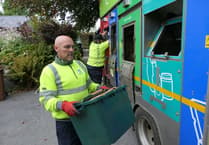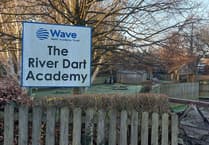SOUTH Hams councillors have just voted to give themselves a 12 per cent ‘pay’ rise.
But they are still saving taxpayers some £31,000 on total annual allowances because there are fewer of them any more.
The district council has agreed to increase the basic councillors’ allowance – the amount each councillor can claim for attending meetings and carrying out council work – from £4,386 to £5,000 a year.
This week South Hams Council issued a statement saying that the increase was ‘in recognition’ of the extra workload district councillors have had to shoulder since the number of councillors representing the district was shrunk from 40 to 31.
The statement also pointed out that the decision was made in line with recommendations from an independent panel which all local authorities are required to set up in order to review members’ allowances.
It is also declared that despite the increase, the total allowances bill had actually gone down by £31,000 because there are fewer councillors claiming it.
Council leader John Tucker said: ‘Being efficient is not just about saving money, it is about doing what we do in a better way which enables us to save time, respond quicker, use fewer resources and yet continue to deliver vital services to our customers.
‘As councillors, this has meant embracing new technology that will allow us to work smarter, using tablets instead of PCs to view committee papers and commenting on them via an online app instead of on paper and embracing new computer software which will allow us to be more mobile, more agile and more available for our residents.’
On top of the basic £5,000 allowance, leading councillors get ‘special responsibility allowances’.
For the leader of the council that adds up to £15,000 a year, while the deputy leader and chairman of the development management committee can claim £7,500 each.
Members of the executive can claim £5,000, while the chairmen of various council committees can claim between £2,500 and £5,000, depending on the job.
The chairman of the council also gets another £5,000.
Councillors can also claim subsistence allowances, travel expenses and a carer’s allowance if they qualify.
Parish and town councillors are also entitled to claim allowances if they wish to – based on a percentage of the district council’s basic allowance.
At last week’s meeting councillors also agreed a pay policy involving top officers’ wages.
The highest paid person in the management structure shared with West Devon Council is Steve Jorden, the executive director for strategy and commissioning and head of paid service, with a salary of £96,840, compared to the lowest paid post of administrative officer of £14,338.
The top executive wage is almost five times higher than the average annual council salary of £19,742.
Between them the eight top officers shared by the two district councils cost taxpayers just over £500,000 a year in salaries.
Dartmouth’s three district councillors – Hilary Bastone, Jonathan Hawkins and Rosemary Rowe – were approached for a comment and we were referred to the press office who issued the following statement: ‘South Hams District Council has been making changes to the way it works for the last two years and a decision was made at full council which demonstrates that even the elected councillors have had to make changes to how they work in order to make the council leaner and more efficient.
‘Full council’s approval of a revised scheme of members’ allowances at full council, confirming an annual saving of just over £31,000 completes the restructuring of elected councillors responsibilities which started at the elections in May 2015.
‘Before the 2015 elections, South Hams District Council had 40 elected members, looking after 61 towns and parishes, now there are only 31 elected members to cover the same area.
‘This means that some councillors have doubled their workload and area of responsibility, while others now have sole responsibility for an area, where they would have previously shared that responsibility with another elected member.
‘Today, in recognition of this additional workload, the basic annual allowance paid to each elected member has been increased from £4,386 to £5,000.
‘Despite this increase, the reorganising of member responsibilities has directly resulted in the £31,000 saving.
‘This decision was made in line with the recommendations of an independent panel which all local authorities are required to set up in order to review members’ allowances.
‘For elected councillors at South Hams, they have also had to adapt to new working practices to help them work in a more efficient way.’





Comments
This article has no comments yet. Be the first to leave a comment.